Related Research Articles

Balarama is a Hindu god and the elder brother of Krishna. He is particularly significant in the Jagannath tradition, as one of the triad deities. He is also known as Baladeva, Balabhadra, Haladhara, Halayudha, and Sankarshana. The first two epithets refer to his strength, the last two associate him with Hala from his strong associations with farming and farmers, as the deity who used farm equipment as weapons when needed.

Arjuna, also known as Partha and Dhananjaya, is one of the major characters of the Indian epic Mahabharata and also appears in other ancient Hindu texts including the Bhagavata Purana. In the epic, he is the third among Pandavas, the five sons of Pandu. The family formed part of the royal line of the Kuru Kingdom. In the Mahabharata War, Arjuna was a key warrior from the Pandava side and slew many warriors including his nemesis Karna unfairly on the order of Krishna to uphold dharma (justice). Before the beginning of the war, his mentor, Krishna, taught him the knowledge of Bhagavad Gita.

Jagannath is a deity worshipped in regional Hindu traditions in India and Bangladesh as part of a triad along with his brother Balabhadra and sister, devi Subhadra. Jagannath within Odia Hinduism is the supreme god, Purushottama, Para Brahman. To most Vaishnava Hindus, particularly the Krishnaites, Jagannath is an abstract representation of Krishna, and Mahavishnu, sometimes as the avatar of Krishna or Vishnu. To some Shaiva and Shakta Hindus, he is a symmetry-filled tantric form of Bhairava, a fierce manifestation of Shiva associated with annihilation.

Abhimanyu is a warrior from the ancient Hindu epic Mahabharata. He was born to the third Pandava prince Arjuna and Yadava princess Subhadra, who was also Krishna's sister. He is believed to be an incarnation of Varchas, son of Chandra. Abhimanyu was raised by his maternal relatives as his father Arjuna, along with his 4 brothers and wife, was sent into Vanvas for 13 years. After his father's return Abhimanyu married Uttarā, the princess of Matsya. During the Kurukshetra War, Abhimanyu fought by his father's side. On the thirteenth day of the war, the mightiest Kaurava warriors came together and formed the Chakravyuha, the young Abhimanyu was able to penetrate it, but could never make his way out, and was slain inside it, fighting them all alone. His son, Parikshit, was the one who saved the lineage from extinction and went onto become a legendary king.

Subhadra is a Hindu goddess, mentioned in the ancient Hindu scriptures like the Mahabharata and the Bhagavata Purana. She is described as the favourite child of Vasudeva and the younger sister of the deities Krishna and Balarama. According to the Mahabharata, Arjuna—one of the Pandava brothers—eloped with her and she later gave birth to his son, Abhimanyu.

In the Hindu epic Mahabharata, Babruvahana was the son of Arjuna, a Pandava prince, and Chitrangada, the princess of Manipur. Babruvahana was adopted as the heir of Manipur by his maternal grandfather and later reigned at the kingdom.

Hindu marriage harmonizes two individuals for ultimate eternity, so that they can pursue dharma (responsibility/duties), arth (meaning), and kama. It is a union of two individuals as spouses, and is recognized by liveable continuity. In Hinduism, marriage is not followed by traditional rituals for consummation. In fact, marriage is considered complete or valid even without consummation because the marriage is between two souls and it is beyond the body. It also joins two families together. Favorable colours are normally red and gold for this occasion.
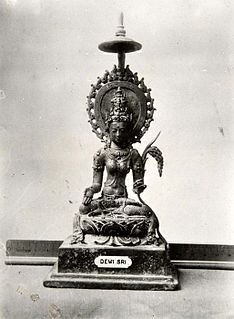
Kakawin Hariwangsa is an Old Javanese poem in Indian metres which tells the story of Krishna, as an Avatar of Vishnu, when he wished to marry the Goddess Rukminī, from the land of Kundina, and daughter of Lord Bhishmaka. Rukmini is an avatar of the goddess Śrī.
Mahabharat is an Indian Hindi-language epic television series based on the ancient Sanskrit epic of the same name. The original airing consisted of a total of ninety-four episodes and were broadcast from 2 October 1988 to 24 June 1990 on Doordarshan. It was produced by B. R. Chopra and directed by his son, Ravi Chopra. The music was composed by Raj Kamal. The script was written by Pandit Narendra Sharma and the Hindi/Urdu poet Rahi Masoom Raza, based on the original story by Vyasa. Costumes for the series were provided by Maganlal Dresswala. Basic source used was Mahabharata BORI Edition.
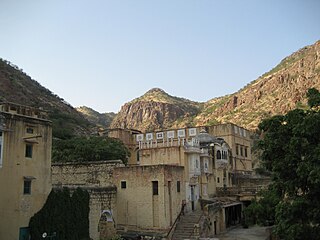
Bhadrajun is a village in the Jalore district of the western part of Rajasthan, India, dating back to ancient times of the Mahabharata epic. However, in recent centuries, it was the scene of warfare between the rulers of the Marwar dynasty and of the Mughal Empire.

Sankhwali is a village in the Ahore tehsil of Jalore district of Indian state Rajasthan.

Akrura was a chief of king Kamsa, an ancient people of India, and a descendant of the Vrishni kula (clan). He is worshipped as Shri Akrurji Maharaj by the present-day Varshney community and is also known as Babrhu. The life of Akrura is depicted in the ancient Indian texts known as the Puranas.
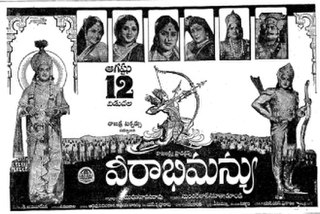
Veerabhimanyu is a 1965 Indian Telugu-language Hindu mythological film produced by Sunderlal Nahta and Doondi and directed by V. Madhusudhan Rao. It stars N. T. Rama Rao, Shobhan Babu and Kanchana, with music composed by K. V. Mahadevan. The film was recorded as a Super Hit at the box office. It was simultaneously filmed in Tamil as Veera Abhimanyu, with slightly different cast. The film had its climax scene shot in Eastmancolour.
Gayopakhyanam is a Telugu play written by Chilakamarti Lakshmi Narasimham in 1890. It is also called Prachanda Yadavam. This play is the forerunner in presenting fictional themes in the Hindu Epics. The plot is based on war between Nara-Narayana, the incarnation of Arjuna and Sri Krishna induced by Gaya, a Gandharva King.

Sri Krishnarjuna Yuddhamu is a 1963 Indian Telugu-language Hindu mythological film, produced and directed by K. V. Reddy under the Jayanthi Pictures banner. It stars N. T. Rama Rao, Akkineni Nageswara Rao and B. Saroja Devi, with music composed by Pendyala Nageswara Rao. It was later dubbed into Kannada and into Tamil.

In the Hindu epic Mahabharata, Laxman Kumara or simply Laxman was the son of Duryodhana, and grandson of Dhritarashtra. He had a twin sister called Lakshmanaa who was kidnapped by her lover, Samba. Not much is revealed about Laxman in the Mahabharata.
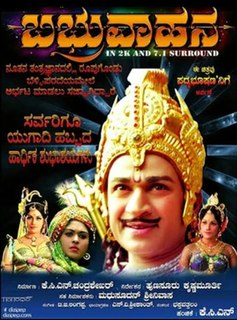
Babruvahana is a 1977 Indian Kannada epic mythological film directed by Hunsur Krishnamurthy. The film stars Rajkumar in a dual role as Arjuna and his son Babruvahana, the titular character alongside an ensemble supporting cast that includes B. Saroja Devi, Kanchana, Jayamala, Vajramuni, Thoogudeepa Srinivas and Ramakrishna.

Vivaha Bhojanambu is a 1988 Telugu-language comedy film directed by Jandhyala who co-produced the film with Jaya Krishna under the J. J. Movies banner. It stars Rajendra Prasad, Chandra Mohan, and Ashwini with music composed by S. P. Balasubrahmanyam. The film's title is the song from the 1957 Telugu film Mayabazar. The original song and its video played during the credits. The film was successful at the box office.
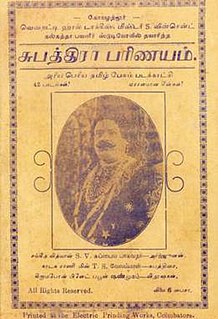
Subhadra Parinayam is a 1935 Indian Tamil language film produced by Samikannu Vincent and directed by Profulla Ghosh. The film featured S. V. Subbaiah Bhagavathar and T. S. Velammal in the lead roles while the comedy track featured Buffoon Shanmugam, Karaikudi Ganesha Iyer and others.